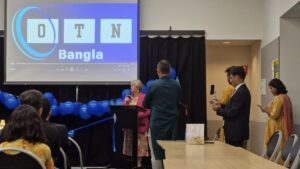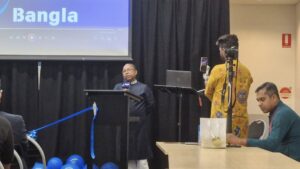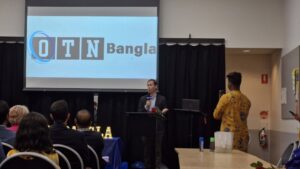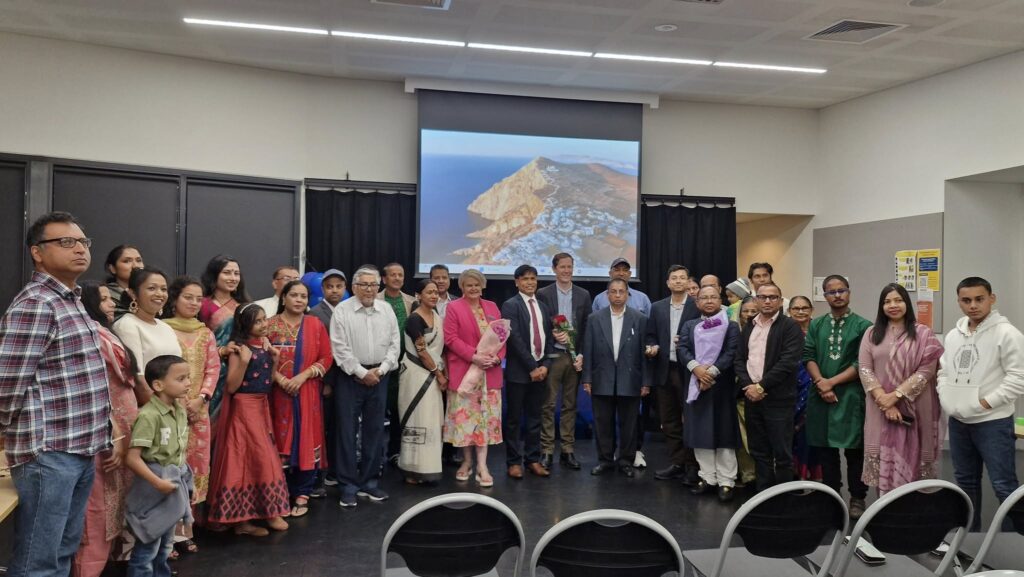The Featherbrook Community Centre in Point Cook witnessed a historic gathering on the evening of 29 March 2025, as the Bangladeshi-Australian community came together to celebrate the grand inauguration of OTN Bangla, a pioneering daily newspaper dedicated to serving the diaspora with news, culture, and a commitment to truth. The event, held against the backdrop of Bangladesh’s 55th Independence Day, was not merely a formal launch but a heartfelt homage to the nation’s past, a reaffirmation of journalistic integrity, and a vibrant showcase of cultural pride.
The ceremony began with a solemn acknowledgment of the significance of March—the month of Bangladesh’s independence. The audience stood in quiet reverence as tribute was paid to the martyrs of the 1971 Liberation War, whose sacrifices birthed a nation. A minute of silence enveloped the hall, a collective pause to honour the bravery of freedom fighters and the countless lives lost in the struggle for sovereignty. The stirring notes of the Australian and Bangladeshi national anthems followed, their melodies intertwining to reflect the dual identity of a community rooted in heritage yet flourishing in a new homeland.
As the formal proceedings commenced, esteemed guests took to the stage, each echoing a shared belief in the power of truthful journalism. Susan McIntyre, Councillor of Wyndham City Council, delivered a poignant address on the critical role of media in an age where misinformation spreads like wildfire. She emphasised that in a world flooded with information, it is often challenging to discern the truth. Publications like OTN Bangla, she noted, carry the responsibility of being beacons of accuracy and trust. Her words resonated deeply, reminding attendees that journalism is not merely a profession but a moral compass for society.

Kamrul Hasan, the esteemed publisher of Panjeri Publications in Bangladesh, built upon this theme, weaving his speech with personal anecdotes and a call to action. He spoke of the journalist’s duty to uphold the truth, especially in times of political and social turbulence. With a tone of quiet urgency, he urged the community to rally behind OTN Bangla, not just as readers but as custodians of a shared vision. “This newspaper is more than ink on paper,” he said. “It is a testament to our resilience, a voice for our stories, and a bridge between generations.” His appeal for support was met with warm applause, a sign of the collective resolve in the room.

The final keynote came from Mathew Hilakari, the local Member of Parliament for Point Cook from the Labor Party, who celebrated the launch as a milestone for multicultural Australia. He reflected on the importance of preserving history and commemorating significant events like Bangladesh’s Independence Day. He addressed the challenges facing independent news media, highlighting the massive decline in traditional journalism. He stressed the need for quality journalism, expressing confidence that OTN Bangla would play a vital role in documenting the community’s narratives with integrity and professionalism. “We need quality journalism,” he asserted. “OTN Bangla will tell our stories, the stories of Bangladesh, and the stories of our local community.” His speech transitioned seamlessly into a broader reflection on the intertwining of memory and progress.
The formalities gave way to an enchanting cultural program, where art became the language of remembrance and joy. Saadat Khondkar opened the performance with a haunting rendition of “Song of Bangladesh” by Joan Baez, its lyrics—a lament for the lives lost in 1971—filling the hall with melancholic beauty. The song, written in the shadow of the 25 March genocide, served as a powerful reminder of the cost of freedom. The mood then shifted as Faayaz Khondkar took the stage, his voice weaving magic through two melodies: “Ami Daam Diye Kinechi Bangla”, a spirited declaration of love for the motherland, and “Momo Chitte Niti Nritye”, a Tagore composition that danced between devotion and artistry. The audience, swaying to the rhythms, was transported to the lush landscapes of Bengal.

Ananya Chakraborty’s soulful patriotic song further electrified the atmosphere, her voice carrying the weight of history and the lightness of hope. But it was the final act that left an indelible mark—Purabi Chowdhury, founder of the Purabi Cultural Foundation, performed a mesmerising dance to “Ekbari Jete Deyna Amar Chhoto Sonar Ga”. Her movements, fluid yet deliberate, told a story of longing and belonging, a narrative familiar to every migrant who carries their homeland in their heart.
As the performances drew to a close, the aroma of traditional Bengali cuisine filled the air, signalling the start of a communal iftar. Plates of piyaju, beguni, and haleem were shared, with laughter and conversation flowing as freely as the tea. Strangers became friends, and friends became family, bound by the threads of culture and collective aspiration.
In his closing remarks, the editor of OTN Bangla Prodip Roy thanked the community for their warmth and pledged that the newspaper would strive to be more than a source of news—it would be a platform for dialogue, a guardian of heritage, and a testament to the unyielding spirit of the Bangladeshi diaspora. The evening ended not with a farewell, but with a promise: that this inauguration was not the culmination, but the beginning of a journey.
As guests stepped out into the crisp autumn night, the words of the speakers, the echoes of the songs, and the taste of shared meals lingered—a reminder that OTN Bangla had already begun to weave itself into the tapestry of their lives. The newspaper’s pages, yet to be printed, would soon carry the stories of this very community, ensuring that their voices, their history, and their dreams would never be silenced.





